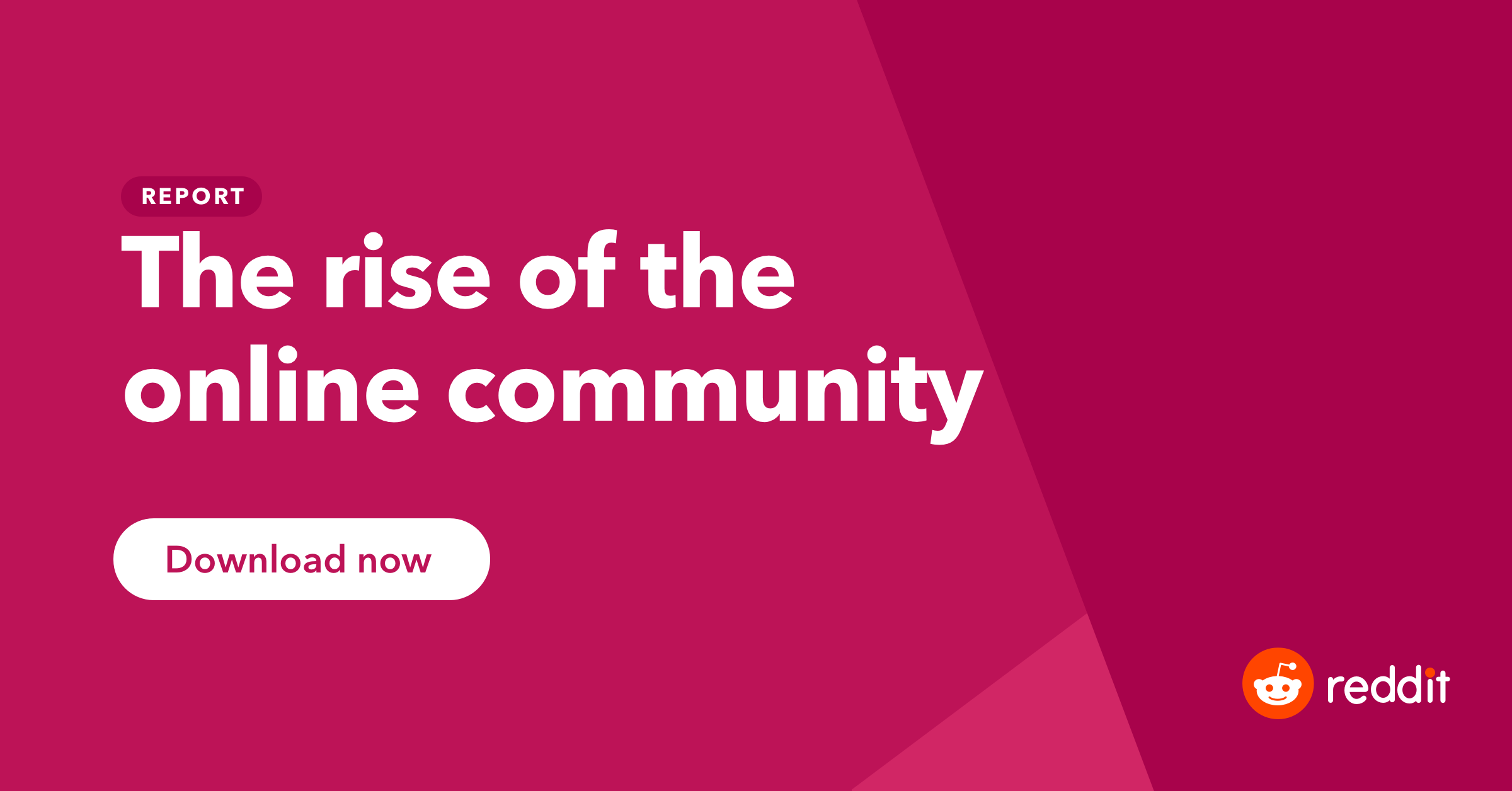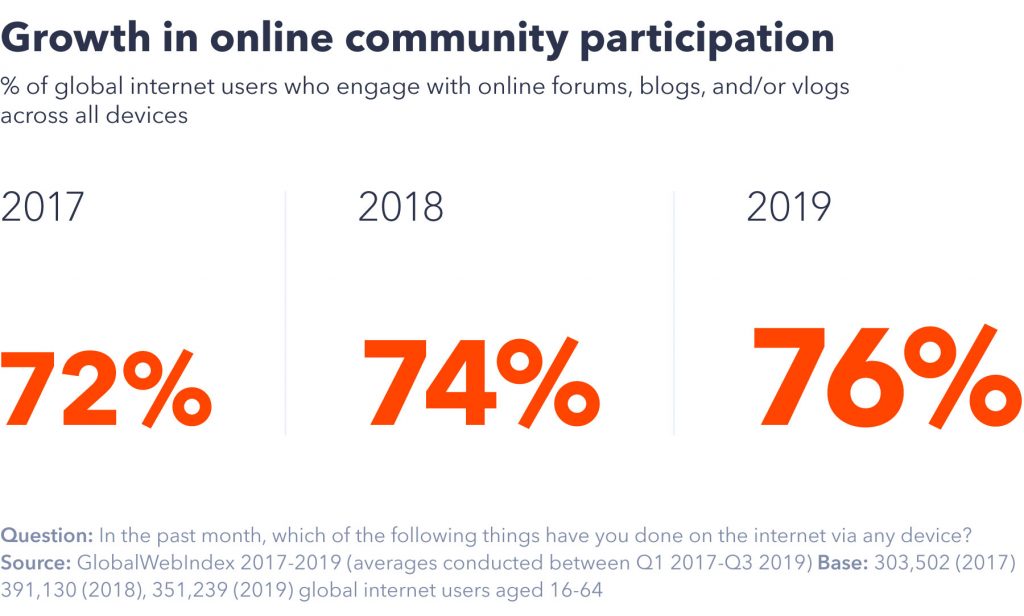We’re now sharing huge amounts of content online – from photos and videos, to product reviews.
Our data shows that in 2019, 83% of global internet users regularly share this kind of information online on a monthly basis, and this is a truly cross-demographic activity, ranging from 70% of boomers to almost 90% of Gen Z and millennials.
This rich stream of content finds its way into many different online environments. But what we share, and why we share it, is changing.
Internet users are moving from sharing as a method of broadcasting themselves, into a way of sharing that has community at its heart.
Online communities are emerging as important spaces for marketers for more reasons than one: to keep track of consumers’ changing expectations, help consumers feel involved, and ultimately deepen the brand-consumer relationship.
To mark the launch of our latest report, co-authored with Reddit, we’ll explore exactly what online communities are bringing to the digital environment, and why they’re emerging as such important marketing channels.
They give us a space to connect and belong.
This new way of sharing has arrived alongside changed in the offline world.
Membership of social groups, like sports clubs and local community groups, has been declining, while online communities have allowed people to make connections and find a sense of belonging in the digital world.
Social media was at one time the poster child for carving out meaningful social spaces, but it’s now arguably created a more individualistic, less communal space.
The authentic connections users look for (but don’t always find) on social media are part of the fabric of online communities – a major reason why people are turning to these spaces more and more.
Findings from one of our recent custom studies show that making connections with other people who have similar interests (66%) is one of the primary drivers behind why users engage in online communities.
They encourage meaningful and respectful conversations.
Our research also set out to understand how users on community platforms, and those on more conventional social media, perceive the spaces they operate in.
This can be a more meaningful measure than just user numbers, as it helps us measure the true impact these social spaces have on their audiences.
Compared to community sites (of which Reddit is a useful example) conventional social media platforms provide users with a better sense of feeling connected to others.
But on all other metrics we asked about, community sites came out on top.
Conversations on them were regarded as more meaningful, their atmosphere was judged to be more respectful, and users felt more able to be themselves and respected by others in turn.

Social media offers a wide network of people for users to connect with, but community site visitors essentially go there to feel more comfortable in their own skin.
To gauge what exactly it was about these different spaces that created this discrepancy, we asked respondents to identify areas where their social media experience could be improved.
45% were frustrated with offensive language or bullying, and 36% desired a more genuine connection with others. A third would prefer less pressure to project a certain self-image.
Social media platforms command users in the hundreds of millions, but in spite of their size, users don’t always feel like they can be their most authentic selves, or that the space is truly respectful.
Community platforms, with hubs geared to connect people around more common interests, and often with tighter controls around who can participate in discussions, allow users to feel more self-confident, validated, and less intimidated.
They’re trusted.
There is another aspect to community-guided sharing that puts online communities apart from social media, and that’s trust. Users aren’t judged based on their profile picture or how many friends they have. There’s less pressure to maintain a positive self-image.
Anonymity, which is part and parcel for many online communities, removes some of this pressure.
From our research, we’ve found that most internet users in the U.S. either don’t mind the anonymous nature of online communities (55%) or think it’s generally a good thing (39%). Just 6% think it’s a negative aspect.
Among those in the U.S. who think anonymity is a good thing, two-thirds believe people are inclined to share things they otherwise wouldn’t when they’re anonymous. They also tend to think people are more honest online when anonymous (60%), and are inclined to post positive/inspirational things (36%).
Anonymity in these environments isn’t something users hide behind to post inflammatory content, but a vital tool for self-expression. By not disclosing their name, they are, in fact, free to display more of their identity.
Online communities are very tight-knit groups, often sharing experiences and knowledge about a specific subject they care about. It would be easy to assume that this is an environment fiercely protected and roped-off from brands. Not so.
They’re important marketing touchpoints.
Our research shows that consumers aren’t hostile toward a brand’s presence on community sites.
In fact, among internet users who use them, more than 4 in 5 would be receptive toward some type of brand participating on these forums.
Since 2015, consumers have become more keen to advocate brands that make them feel involved, or let them feel like they’re in a one-to-one relationship.
The appetite for meaningful social bonds among brands and their online audiences is bigger than just what happens between people. Brands are part of the solution in providing internet users with the authentic relationships they increasingly desire.
These personal relationships are likely to make an impact when dealing with niche interest groups – an area where community sites thrive. And while some marketers are doubling down on mass marketing, there’s a lot to be said for zeroing in on specific communities with dedicated interests.
Sometimes called “micro-tribes,” these are high-value consumer groups worth engaging with because they show greater brand loyalty and brand advocacy vs. the mass market.
On the messaging front, brands should have the courage to be bold, offbeat, and funny in community spaces. These are some of the characteristics that online community users most appreciate, over-indexing for most of them.

Community users want more from brands than just reliability, so when brands adopt a more informal personality, they can build a lot of credibility.
Marketers have much to gain from embracing and engaging in these spaces, though the opportunity differs from mass marketing channels.
Members of online communities want brands to get involved; they want to have a personal relationship with them. Adopting a more offbeat, humanistic persona, and championing the interchange of ideas in a community environment are just some of the ways marketers can take advantage.

